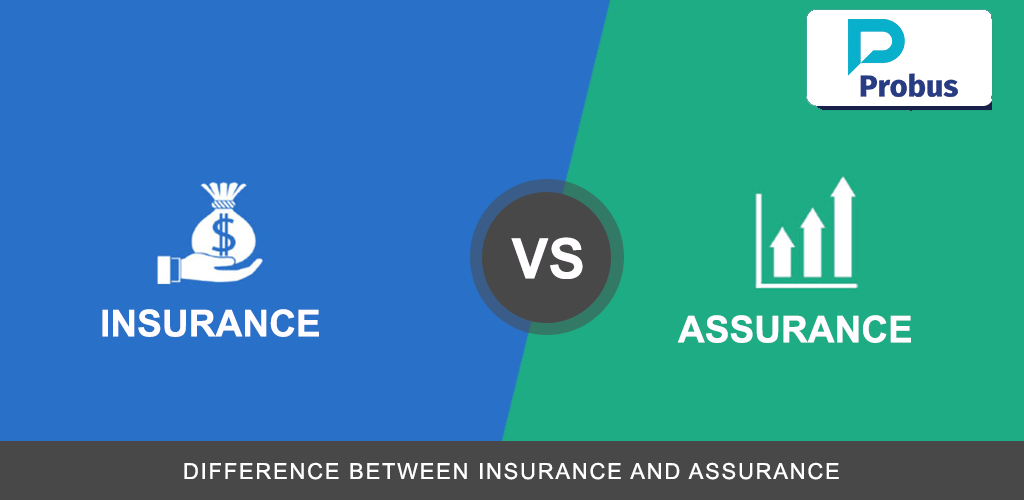Do you feel that policy-related jargons are complicated? Are you dependent on your agents for financial planning? If yes, then you will definitely find this blog useful. It discusses the difference between two commonly used words in the policy sector- “Insurance” and “Assurance.” Although these two words are often used interchangeably, technically, they are different terms. Besides, you need to understand the core difference so that you can make the most out of your policies.
What is Insurance?
Insurance is the type of contract that takes place between the policyholder and the insurance selling company. As per this contract, the insurance company will offer compensation to the policyholder if and when a specific loss takes place. But for the coverage to be available, the policyholder needs to pay all the premiums on time.
The compensation offered by the insurance company will be equal to the value of the loss suffered by the policyholder. Remember that the insurance company is liable to cover the losses within the policy period or tenure of the policy. Beyond that, the policyholder gets no coverage or compensation.
Here’s an example for your better understanding!
Suppose you have bought a car. According to Indian law, every vehicle owner should mandatorily have a third-party policy. This policy offers compensation in case any third-party damage takes place. You will get compensated against damages to the third party, any injury to them, or even for the unfortunate loss of precious life while you are driving. So, now you will have to buy a third-party car insurance policy.
In order to enhance the scope of coverage, you may also buy an add-on, for instance, the Own Damage add-on. This will allow you to put a claim for the damage that has been caused to your four-wheeler. This add-on policy helps you to enjoy coverage against instances of man-made calamities, natural disasters, fire and accidents.
What is Assurance?
The term “Assurance” is generally associated with life insurance policies. Basically, the policyholder gets the assurance that he/she will get compensated when a specific event (death/disability) takes place. Unlike general insurance plans and schemes, life insurance policies come with a longer tenure.
Here’s another example so that you understand assurance better!
Suppose you have bought an endowment plan for yourself. Such policies offer both death benefits as well as maturity benefits. So, you will enjoy maturity benefits upon the completion of the policy tenure in the form of a lump sum amount. Also, in case of your unfortunate demise, the nominee mentioned in the policy will get the assured sum.
How’s Assurance Different From Insurance?
| Criteria | Insurance | Assurance |
| Types of policies | Health insurance, car insurance, mobile insurance and so on | Term insurance, ULIP, life insurance, endowment plans, etc. |
| Category | General insurance policies | Life insurance policies |
| Coverage | Home insurance, medical insurance, motor insurance, property insurance etc. | Life, death/disability coverage |
| Claim payment | Almost equal to the value of the loss incurred. For instance, you will be compensated for the cost you have incurred in getting your car repaired | Nominee gets a pre-decided amount when a specific event takes place. The policyholder gets maturity benefits when the tenure gets over. For instance, the demise of the policyholder or the occurrence of a fatal health condition |
| Objective | The idea is to offer coverage to the policyholder in case of losses like flood, theft, accident etc. | Here the objective is to offer monetary support in dire situations such as disability, death or major health condition. |
| Renewability | The policy gets renewed on an annual basis or when it expires. | NA |
| Total number of claims allowed | The policyholder can make multiple claims | One claim only |
| Nature of risk | Calamities, accidents, fire and so on | Predictable but uncertain events such as demise, disability etc. |
| What is insured? | Property and people | People |
| Number of insured persons | One or more (Depends on the policy) | One |
Wrapping up!
When you proceed to buy a policy, you will find these two words mentioned in your policy paper. It is, therefore, necessary that you understand the difference between the two. If you know the meaning and difference between “insurance” and “assurance” closely, then you will be in a position to understand the payout terms and conditions closely. Besides, you won’t have to depend on any agent to get a better idea of the policy.








